COMMUNITY
JOIN our Community of Practice
For teachers and professionals in education
Community of Practice (CoP) for Digital Literacy and Inclusion
The Community of Practice (CoP) is created as a space for sharing, where teachers and professionals in the field of education will learn from and inspire each other by co-creating innovative pedagogies, developing best practices, and fostering a collaborative learning environment.
By joining the CoP, you have an opportunity to learn from and with international colleagues through shared practices, which are supported by activities and tools designed by IGNITION partners. You will learn more about digital skills and competences.
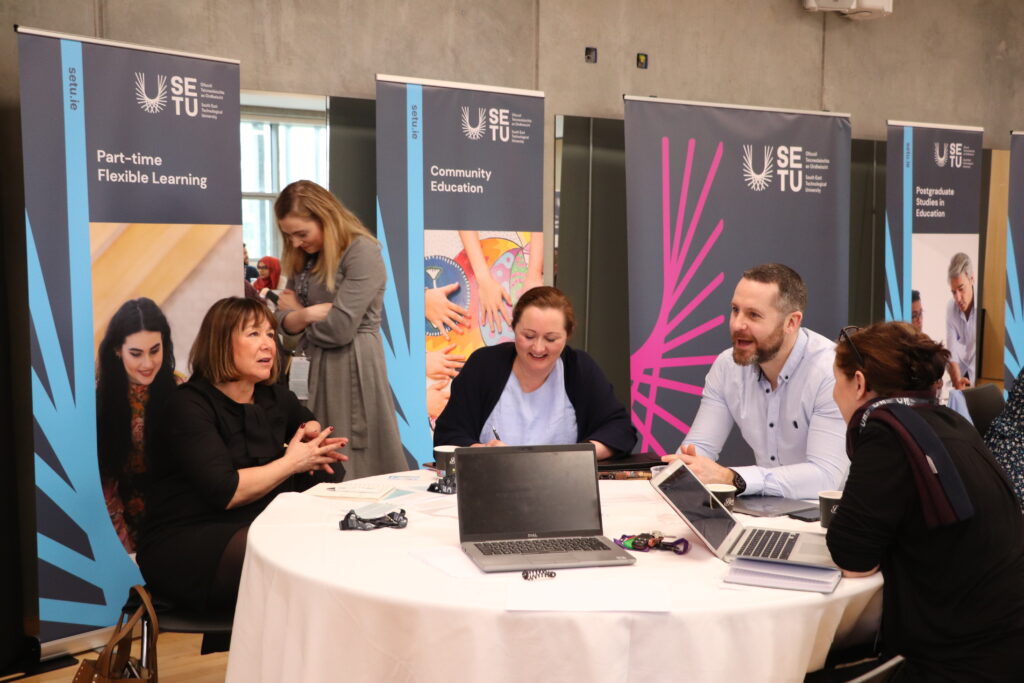
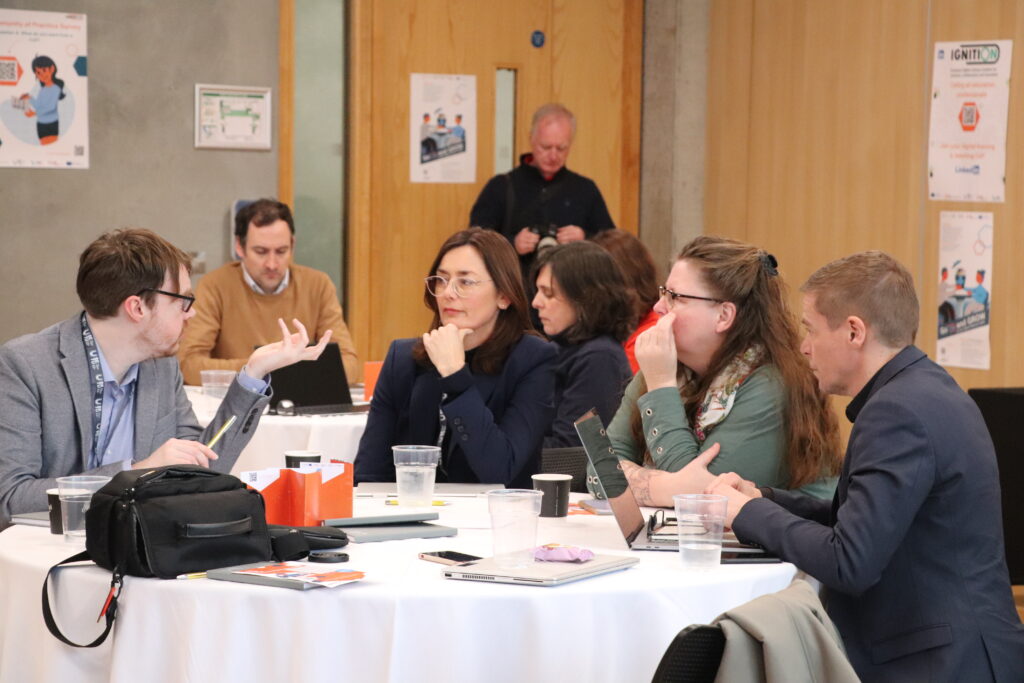
The CoP is open to every teacher and professional in the educational field from all levels of digital skill sets. We also welcome warmly digitally highly skilled teachers for sharing their knowledge.
Join us and become future-ready for the next generation of digital youth!
The official kick-off of the CoP took place in the week of March 14-16, 2023, during an IGNITION Learning Teaching and Training Activity hosted by our partner in Ireland, South East Technological University in Waterford. After that, all CoP’s events are organized in an online setting and will be communicated through IGNITION’s LinkedIn page.
Follow the IGNITION_Erasmus page on LinkedIn to join our IGNITION Community of Practice and learn more about our upcoming event.
COMMUNITY

JOIN our Community of Practice
For teachers and professionals in education
Community of Practice (CoP) for Digital Literacy and Inclusion
The Community of Practice (CoP) is created as a space for sharing, where teachers and professionals in the field of education will learn from and inspire each other by co-creating innovative pedagogies, developing best practices, and fostering a collaborative learning environment.
By joining the CoP, you have an opportunity to learn from and with international colleagues through shared practices, which are supported by activities and tools designed by IGNITION partners. You will learn more about digital skills and competences.

The CoP is open to every teacher and professional in the educational field from all levels of digital skill sets. We also welcome warmly digitally highly skilled teachers for sharing their knowledge.
Join us and become future-ready for the next generation of digital youth!
The official kick-off of the CoP took place in the week of March 14-16, 2023, during an IGNITION Learning Teaching and Training Activity hosted by our partner in Ireland, South East Technological University in Waterford. After that, all CoP’s events are organized in an online setting and will be communicated through IGNITION’s LinkedIn page.
Follow the IGNITION_Erasmus page on LinkedIn to join our IGNITION Community of Practice and learn more about our upcoming event.
stay stuned for upcoming events
Previous events
Event #3: Digital Gamification for Inclusive Education (MARCH 12, 2024)
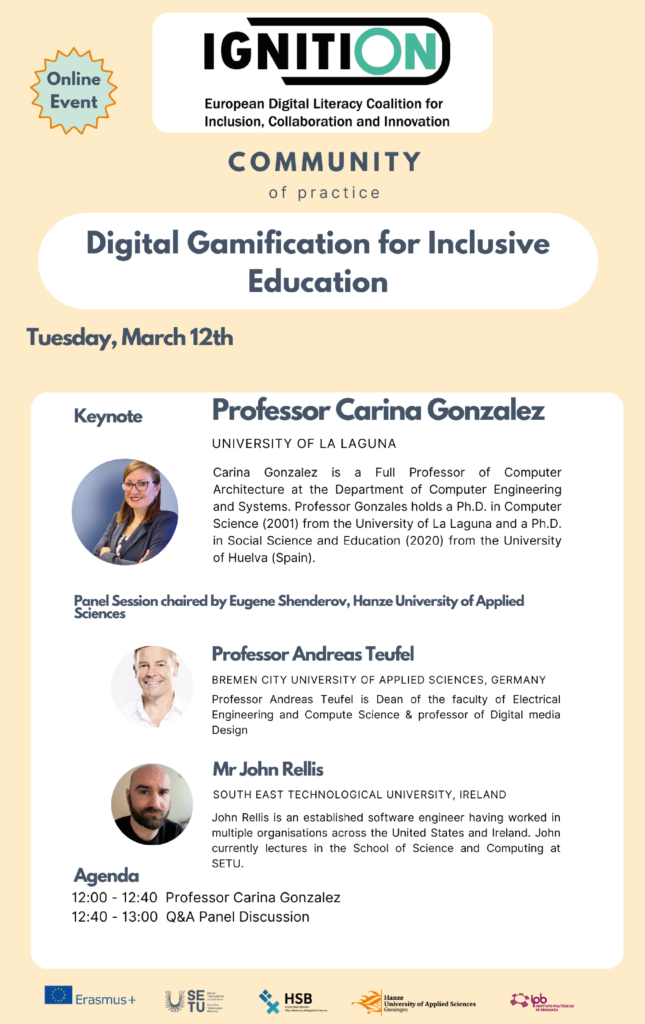
Digital Gamification for Inclusive Education
Gamification can promote active participation, collaboration, and personalized learning experiences, catering to individual strengths and preferences.
Carina Gonzalez – In this keynote, discussed gamification strategies, tools, and resources. She introduced principles for designing gamified learning experiences that catered to diverse learners and demonstrated tools and resources to integrate gamification into teaching practices.
The event is part of the IGNITION Erasmus+ funded project, which aims to enhance digital literacy and inclusion among lecturers, faculty staff, students, and life-long learners across Europe. Project partners include Hanze University of Applied Sciences (The Netherlands); Hochschule Bremen (Germany); Polytechnic Institute of Braganza (IPB)(Portugal); and the School of Education and Lifelong Learning at SETU.
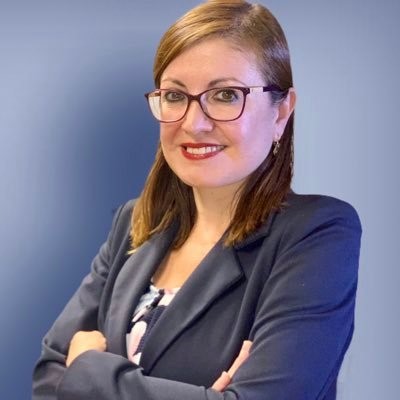
Professor Carina Gonzalez
Carina González is a Full Professor of Computer Architecture Technology at the Department of Computer Engineering and Systems of the University of La Laguna (Spain). She lectures the School of Engineering and Technology, in the Faculty of Education, in the Faculty of Fine Arts and the Faculty of Social Science and Communication at the University of La Laguna.
Carina holds a Ph.D. in Computer Science (2001) from the University of La Laguna and a Ph.D. in Social Science and Education (2020) from the University of Huelva (Spain). She is the head of the research group Interaction, ICT, and Education (ITED). Carina is the Chair of the Women Studies Research Institute (ULL) and the Chair of the Digital Culture of the University of La Laguna. She also has been Director of the Innovation and Educational Technology (2011; 2015-2019).
Event #3: Digital Gamification for Inclusive Education (MARCH 12, 2024)

Digital Gamification for Inclusive Education
Gamification can promote active participation, collaboration, and personalized learning experiences, catering to individual strengths and preferences.
Carina Gonzalez – In this keynote, discussed gamification strategies, tools, and resources. She introduced principles for designing gamified learning experiences that catered to diverse learners and demonstrated tools and resources to integrate gamification into teaching practices.
The event is part of the IGNITION Erasmus+ funded project, which aims to enhance digital literacy and inclusion among lecturers, faculty staff, students, and life-long learners across Europe. Project partners include Hanze University of Applied Sciences (The Netherlands); Hochschule Bremen (Germany); Polytechnic Institute of Braganza (IPB)(Portugal); and the School of Education and Lifelong Learning at SETU.
Professor Carina Gonzalez
Carina González is a Full Professor of Computer Architecture Technology at the Department of Computer Engineering and Systems of the University of La Laguna (Spain). She lectures the School of Engineering and Technology, in the Faculty of Education, in the Faculty of Fine Arts and the Faculty of Social Science and Communication at the University of La Laguna.
Carina holds a Ph.D. in Computer Science (2001) from the University of La Laguna and a Ph.D. in Social Science and Education (2020) from the University of Huelva (Spain). She is the head of the research group Interaction, ICT, and Education (ITED). Carina is the Chair of the Women Studies Research Institute (ULL) and the Chair of the Digital Culture of the University of La Laguna. She also has been Director of the Innovation and Educational Technology (2011; 2015-2019).

Event #2 : Generative AI for Inclusive Education: opportunities and issues (NOVEMBER 7TH)
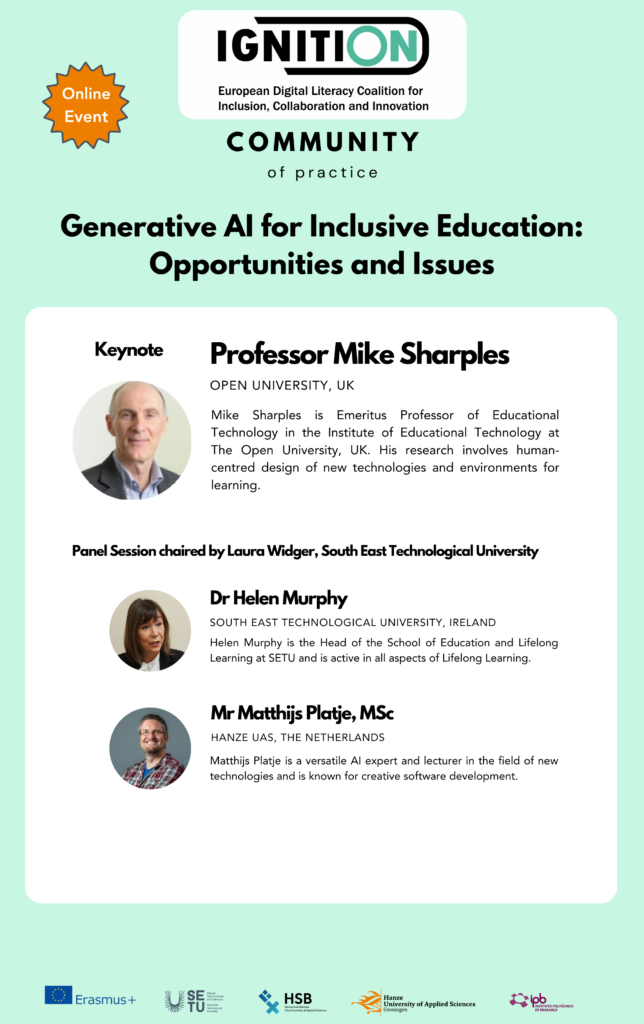
Generative AI for Inclusive Education: Opportunities and Issues
The School of Education and Lifelong Learning at SETU Waterford successfully conducted the 3rd IGNITION Community of Practice event, centering on Generative AI’s role in inclusive education. Held on November 7th, this online event attracted educators from diverse universities.
Keynote speaker Professor Mike Sharples, a distinguished figure in educational technology from The Open University, UK, brought his extensive expertise in human-centered design and AI to the forefront. His compelling presentation delved into the complex challenges and promising opportunities of generative AI systems like ChatGPT in higher education. Professor Sharples, known for his pioneering contributions to mobile learning and authoring over 300 publications, emphasized the importance of AI literacy and developing institutional policies for AI’s fair use in education.
The event also featured a panel discussion led by Laura Widger from SETU, with valuable input from Dr. Helen Murphy (SETU) and Matthijs Platje (Hanze UAS). The panel, enriched by Professor Sharples’ insights, focused on AI-assisted assessment and the ethical use of AI tools in education, discussing ways to empower students and integrate AI effectively into the curriculum.
We are thrilled to have sparked such an essential conversation on AI in education, greatly enhanced by Professor Sharples’ expertise. Our heartfelt thanks go to SETU, all participants, and especially Professor Sharples for making this event insightful. Stay tuned for more innovative discussions in our future events.
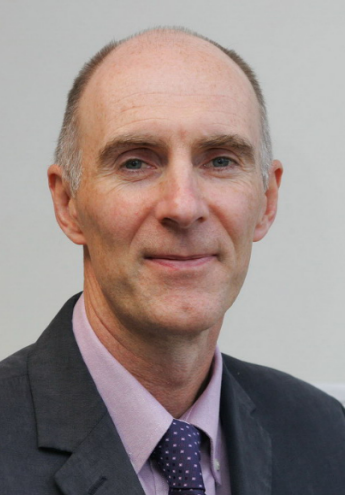
Prof. Mike Sharples
Mike Sharples is Emeritus Professor of Educational Technology in the Institute of Educational Technology at The Open University, UK. His research involves human-centred design of new technologies and environments for learning. He inaugurated the mLearn conference series and was Founding President of the International Association for Mobile Learning. He is Associate Editor in Chief of IEEE Transactions on Learning Technologies. He established the Innovating Pedagogy report series and is author of over 300 books and papers in the areas of educational technology, science education, human-centred design of personal technologies, artificial intelligence and cognitive science.
Event #2 : Generative AI for Inclusive Education: opportunities and issues (NOVEMBER 7TH, 2023)

Generative AI for Inclusive Education: Opportunities and Issues
The School of Education and Lifelong Learning at SETU Waterford successfully conducted the 3rd IGNITION Community of Practice event, centering on Generative AI’s role in inclusive education. Held on November 7th, this online event attracted educators from diverse universities.
Keynote speaker Professor Mike Sharples, a distinguished figure in educational technology from The Open University, UK, brought his extensive expertise in human-centered design and AI to the forefront. His compelling presentation delved into the complex challenges and promising opportunities of generative AI systems like ChatGPT in higher education. Professor Sharples, known for his pioneering contributions to mobile learning and authoring over 300 publications, emphasized the importance of AI literacy and developing institutional policies for AI’s fair use in education.
The event also featured a panel discussion led by Laura Widger from SETU, with valuable input from Dr. Helen Murphy (SETU) and Matthijs Platje (Hanze UAS). The panel, enriched by Professor Sharples’ insights, focused on AI-assisted assessment and the ethical use of AI tools in education, discussing ways to empower students and integrate AI effectively into the curriculum.
We are thrilled to have sparked such an essential conversation on AI in education, greatly enhanced by Professor Sharples’ expertise. Our heartfelt thanks go to SETU, all participants, and especially Professor Sharples for making this event insightful. Stay tuned for more innovative discussions in our future events.
Prof. Mike Sharples
Mike Sharples is Emeritus Professor of Educational Technology in the Institute of Educational Technology at The Open University, UK. His research involves human-centred design of new technologies and environments for learning. He inaugurated the mLearn conference series and was Founding President of the International Association for Mobile Learning. He is Associate Editor in Chief of IEEE Transactions on Learning Technologies. He established the Innovating Pedagogy report series and is author of over 300 books and papers in the areas of educational technology, science education, human-centred design of personal technologies, artificial intelligence and cognitive science.

Event #1 : Promoting Digital Equity (JUNE 13, 2023)
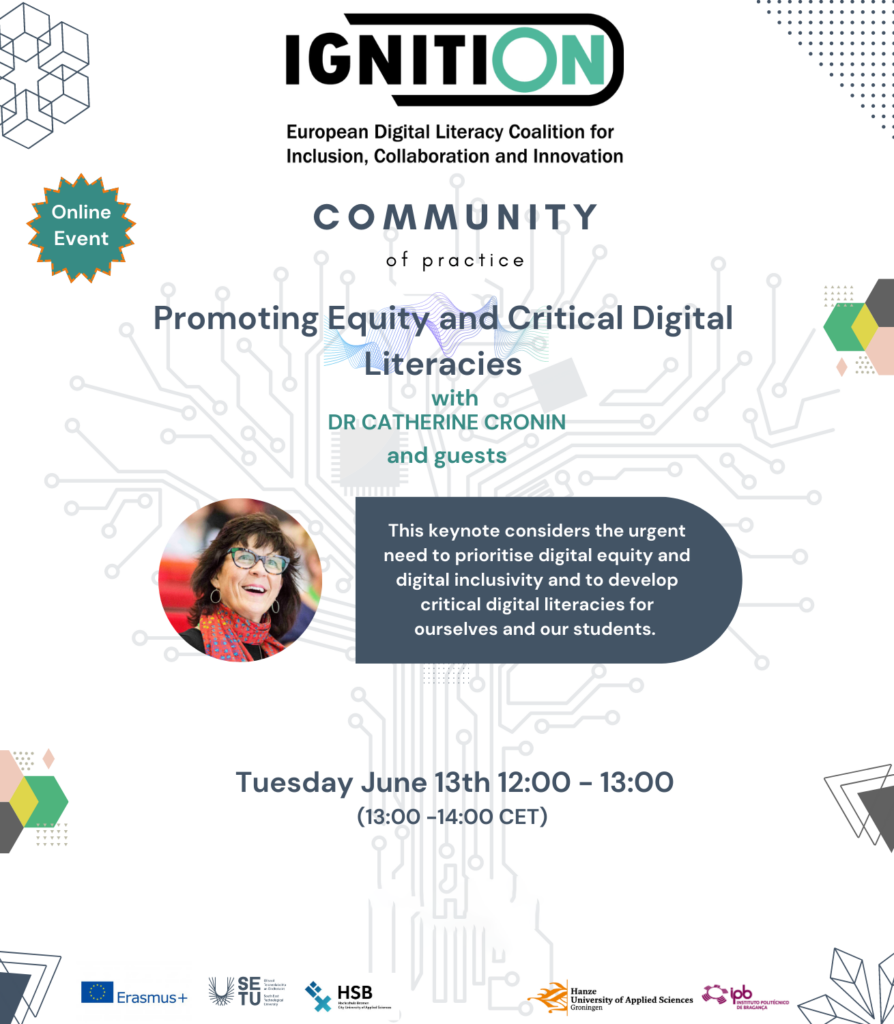
Dr Catherine Cronin
Catherine Cronin is an independent scholar focusing on critical and social justice approaches in digital, open and higher education. She is co-editor of Higher Education for Good: Teaching and Learning Futures (2023, forthcoming) and was a 2022 GO-GN Fellow. Catherine has worked in higher education and community education for many years, most recently as digital and open education lead in Ireland’s National Forum for the Enhancement of Teaching & Learning in Higher Education. You can find Catherine online at @catherinecronin@mastodon.ie and https://catherinecronin.net.
Promoting Equity, Critical Digital Literacies, and Hope in Troubled Times
Many of us were thinking deeply about our roles as educators, learners, and citizens (local and global) in a time of increasing inequality, climate crisis, austerity, and instability. The challenges we faced within higher education – both global and specific to our own contexts – could only be considered within this bigger picture. Understanding the inequalities and power dynamics at work in and through digital technologies/infrastructures was essential and constituted a vital aspect of critical digital literacies (Czerniewicz & Carvalho, 2022; Ross et al., 2022). The keynote considered the urgent need to prioritize digital equity and digital inclusivity and to develop critical digital literacies – for ourselves and our students. Particular attention was paid to how we could amplify the effectiveness of this work by collaborating across roles, institutional, and geographic boundaries. Cognizant of the trauma and turbulence of the past three years, the keynote explored what it meant for each of us to build and foster critical digital literacies, to support learning and one another, and to build critical and epistemic hope.
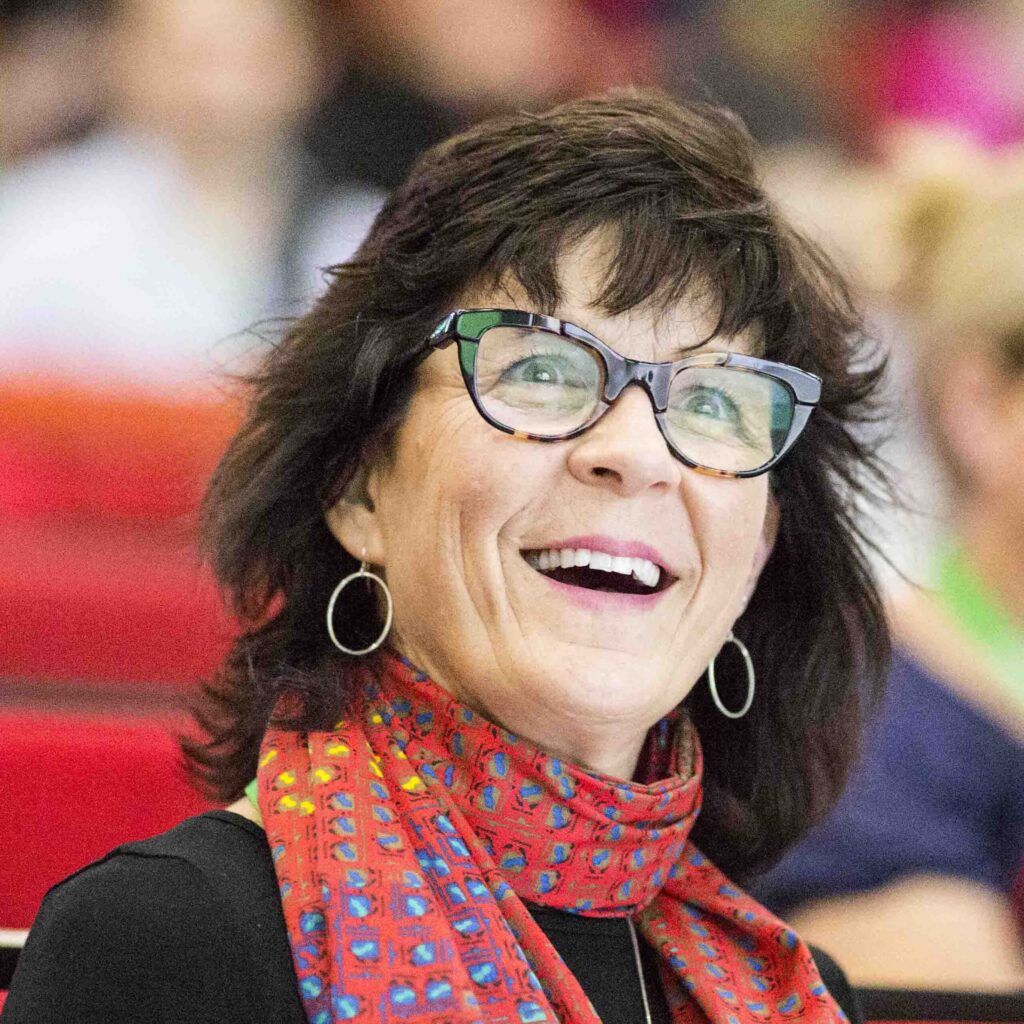

Promoting Equity, Critical Digital Literacies, and Hope in Troubled Times
Many of us were thinking deeply about our roles as educators, learners, and citizens (local and global) in a time of increasing inequality, climate crisis, austerity, and instability. The challenges we faced within higher education – both global and specific to our own contexts – could only be considered within this bigger picture. Understanding the inequalities and power dynamics at work in and through digital technologies/infrastructures was essential and constituted a vital aspect of critical digital literacies (Czerniewicz & Carvalho, 2022; Ross et al., 2022). The keynote considered the urgent need to prioritize digital equity and digital inclusivity and to develop critical digital literacies – for ourselves and our students. Particular attention was paid to how we could amplify the effectiveness of this work by collaborating across roles, institutional, and geographic boundaries. Cognizant of the trauma and turbulence of the past three years, the keynote explored what it meant for each of us to build and foster critical digital literacies, to support learning and one another, and to build critical and epistemic hope.

dr. Catherine Cronin
Catherine Cronin is an independent scholar focusing on critical and social justice approaches in digital, open and higher education. She is co-editor of Higher Education for Good: Teaching and Learning Futures (2023, forthcoming) and was a 2022 GO-GN Fellow. Catherine has worked in higher education and community education for many years, most recently as digital and open education lead in Ireland’s National Forum for the Enhancement of Teaching & Learning in Higher Education. You can find Catherine online at @catherinecronin@mastodon.ie and https://catherinecronin.net.
